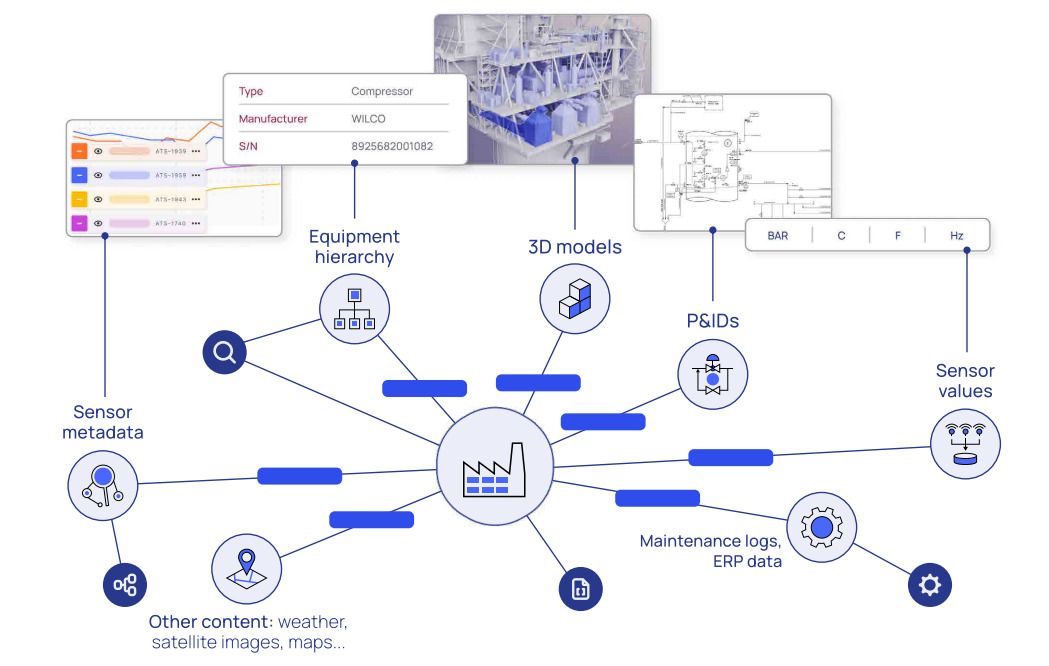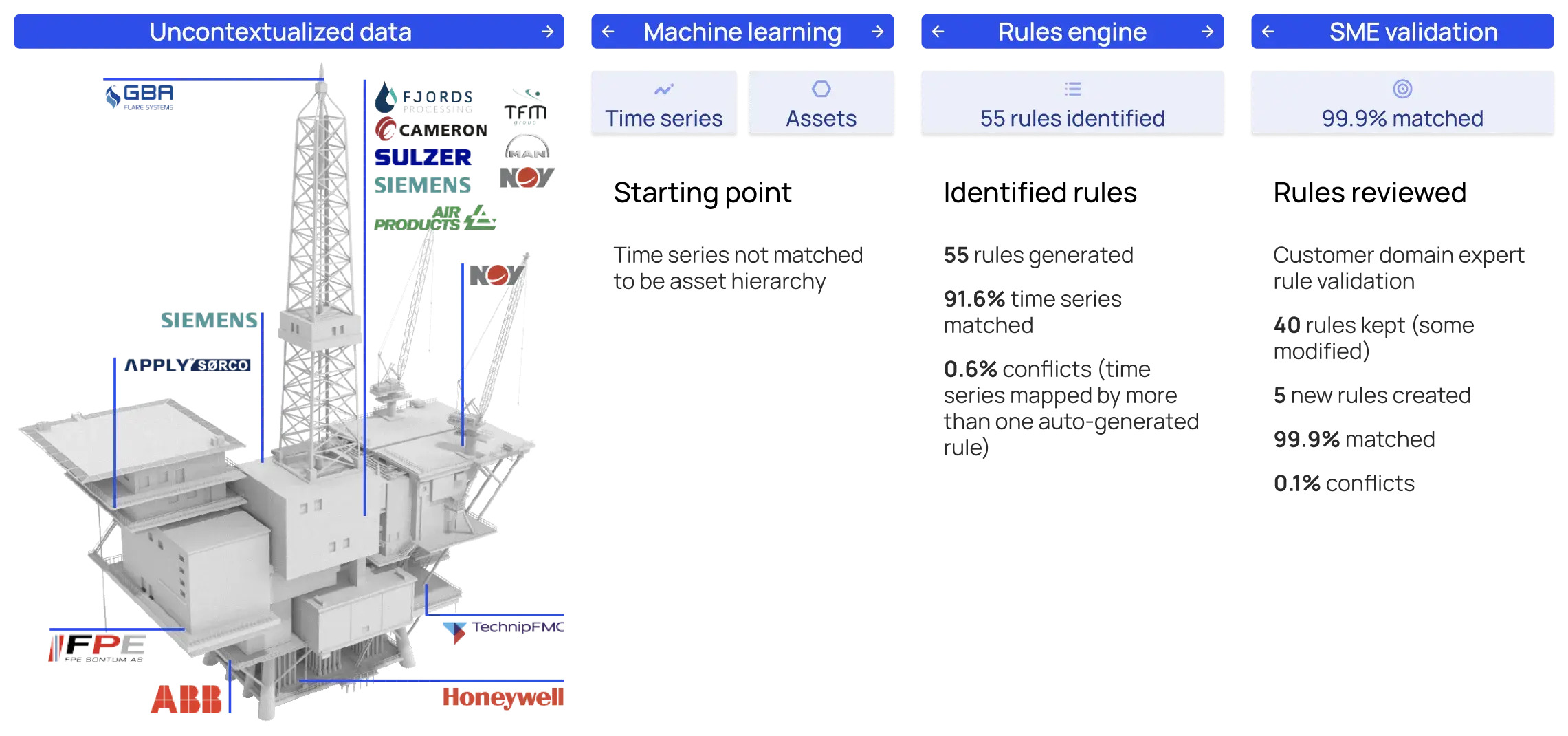Although the oil and gas industry is unlikely to be the first thing that comes to mind when the subject of AI comes up, the fact is that AI, particularly in the form of machine learning (ML), has been integral to operations for more than a decade.

—Karen Czachorowski, IT and data delivery lead, Aker BP. (Source: Aker BP)
According to Karen Czachorowski, IT and data delivery lead at Aker BP, ML is essential to operations because of the value it delivers.
“Machine learning models can predict the most productive drilling sites, optimize drilling paths and monitor reservoir performance in real time, enhancing extraction efficiency and reducing environmental impact,” she explained.
ML plays a vital role in the energy industry, and new technologies continue to change the playing field. Evidence of this is the fact that generative AI is beginning to gain ground.
“Generative AI can revolutionize the oil and gas industry by enabling more accurate reservoir modeling and seismic interpretation, enhancing offshore operations, improving predictive maintenance and on-demand maintenance and optimizing supply chains and logistics, thus increasing efficiency and reducing costs across the entire value chain,” Czachorowski said.
The increasing desire for and growing implementation of generative AI in the oil and gas industry has been spurred by two fundamental problems according to Czachorowski: supply chain bottlenecks and quality in execution. In her view, these issues are derailing many new projects aimed at meeting energy security needs and facilitating the energy transition, pushing them over budget or behind schedule and, in some cases, diminishing returns.
“Without digital transformation utilizing industrial data and AI, we are not set up for success. Therefore, the need to reinvent the execution of industrial capital projects is immediate and urgent,” she said.
Applying AI to operations
In oil and gas operations, AI models can use data from sensors and machinery to reduce downtime and maintenance costs by predicting equipment failures. This predictive capability ensures continuous operations and extends the service life of expensive equipment. Additionally, AI can analyze historical and real-time data to identify inefficiencies and recommend adjustments, potentially delivering higher output and lower operational costs, enhancing efficiency and improving productivity.

—Jason Schern, CTO, Cognite (Source: Cognite)
“I can tell you that your ability to predict failure of equipment accurately and resolve that failure before it happens has millions and millions of dollars of impact in terms of lost downtime,” Jason Schern, CTO of Cognite, told E&P. “The repair costs if something actually fails and goes down is orders of magnitude greater than if you can just provide preventative maintenance to prevent it from going down.”
Czachorowski explained how Aker BP has begun implementing generative AI in its operations, partnering with Cognite to develop the Cognite AI DocParser, an AI agent that automates attribute extraction for material master registration to significantly reduce manual processes.
Based on Aker BP’s initial tests, the DocParser can handle 67% of the equipment material master tasks, leading to considerable cost savings, better data quality and fewer duplicate items without making any changes to the AI model itself. Although human verification of the agent’s work is still part of the process, Czachorowski described the results as “impressive” and said she sees the potential for great savings using this tool.
“It’s probably not an exaggeration to say that the impact of machine learning in the oil and gas industry has been multiple percentage points to the top line and the bottom line of companies around the world,” Schern said. “And it’s why they spend so much time working on it.”

Understanding the challenges
While the adoption of AI can address several key challenges in the oil and gas sector, offering solutions that enhance efficiency and transform the industry’s operations and decision-making processes, there are still barriers, with the main issue being the many types of data that must be collected and interpreted.
Industrial data is often varied and messy, and different data sources rarely match up perfectly. This mismatch creates a challenge for using AI effectively. For both ML and generative AI, inconsistency makes the data more difficult to work with, said Schern.
“In the case of machine learning, you need good clean data along with labels and relevant features,” Schern explained. “If I have data that’s coming from a pressure gauge, I need labels that tell me at a certain point if something is occurring somewhere else…. Being able to combine those things is what gives you really rich data for building machine learning models, which is going to make predictions more accurate.”
Another barrier is the lack of people within the industry who know how to properly apply ML and generative AI tools to capture the greatest advantage. Finding experts with advanced skills and specific industry knowledge can be challenging and expensive, particularly in an environment in which many businesses are competing for the same talent.
Change management is another impediment to adoption. Organizations often resist adopting new technologies, especially in areas where technology is not widely used. People can be skeptical about new technology if they do not fully understand it. Providing training to help workers understand and use the technology can speed up the innovation process.
“Embracing AI is not just about technology; it is about transforming how we operate and unlock value from our data,” Czachorowski said. “A successful system comprises people, processes, data, tools, and their interactions. Ensuring these elements work together in alignment is crucial and remains an ongoing challenge.”
Thankfully, said Schern, a new wave of professionals with the necessary skill set is entering the industry.
“The next generation is super familiar with this type of technology and usage in their daily life,” he said. “They’re the most prepared generation to be able to take advantage of large language models in their daily work.”
As new workers enter the industry, finding a way to facilitate knowledge transfer to ensure valuable knowledge is passed from experienced employees to newcomers is critically important. Large language models are helping to address this concern by quickly providing important information when asked the right questions. According to Schern, an operator in Japan has adopted a few of Cognite’s AI solutions to fast-track learning for less-experienced workers.
Digital technologies shape the future of energy
Despite the barriers to implementing this technology, it is clear that AI can enhance hydrocarbon exploration and extraction.
These technologies can analyze vast amounts of data from sensors and monitoring systems installed on offshore rigs and platforms, detecting patterns and anomalies that indicate potential issues. Today, AI-powered analytics and predictive modeling are empowering offshore facilities with real-time, actionable intelligence, leading to safer, more efficient and cost-effective operations.
“Integrating AI into daily processes is reshaping our work by driving efficiencies, reducing costs, enhancing safety, and enabling more informed decision-making, thereby transforming traditional operations and creating new opportunities for growth and innovation,” Czachorowski said.
Making AI an integral part of operations—as is the case in geological data interpretation—empowers the energy industry to achieve greater automation, optimize processes in real time and respond swiftly to changing market conditions, ultimately driving growth and improving economics.
As AI agents become more prevalent in day-to-day activities, Schern believes more improvements in efficiency will reveal themselves in the workforce.
“I fully expect that at some point in the future, compute cost and tooling will improve to the point that companies, if they have contextualized data, are going to be able to fine tune and train their own LLMs (large language models) that will just know their data,” he said. “When you can do that, it reduces the burden of having to provide information along with your question.”

Because of the interpretive ability of LLMs, companies will begin to see better, well formulated answers to their questions about operations, Schern said.
“At some point, will the reasoning engine of large language models join up with the predictive capabilities of machine learning? It’s a distinct likelihood sometime in the future,” he said.
With the oil and gas industry embracing the power of ML and AI, it is clear that this advanced technology is redefining operations. Although the road ahead is not without challenges, ongoing integration of advanced technologies will continue to deliver benefits, and as AI tools become more sophisticated and widespread, they will provide new opportunities for innovation and growth.
Recommended Reading
BP Cuts Senior Leadership Bonuses After Missing 2024 Targets
2025-02-11 - BP will cut performance-related bonuses for its senior leaders to 45% after the company missed some of its financial goals in 2024.
BP Cuts Over 5% of Workforce to Reduce Costs
2025-01-16 - BP will cut over 5% of its global workforce as part of efforts to reduce costs and rebuild investor confidence.
BP Cuts Renewable Investment, Boosts Oil and Gas in Strategy Shift
2025-02-26 - BP aims to grow oil and gas production to between 2.3 MMboe/d and 2.5 MMboe/d in 2030.
Executive Compensations Rising in Sync with Shareholder Payoffs
2025-02-04 - Compensation for oil and gas executives, up an average 8% to 10%, is increasingly tied to stock metrics, rewarding performance instead of growth, according to an Alvarez & Marsal report.
Phillips 66’s NGL Focus, Midstream Acquisitions Pay Off in 2024
2025-02-04 - Phillips 66 reported record volumes for 2024 as it advances a wellhead-to-market strategy within its midstream business.
Comments
Add new comment
This conversation is moderated according to Hart Energy community rules. Please read the rules before joining the discussion. If you’re experiencing any technical problems, please contact our customer care team.


